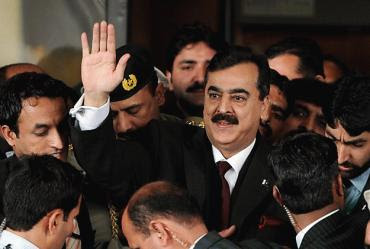
ISLAMABAD: A direct intervention by Chief of the Army Staff Gen Ashfaq Parvez Kayani and warning of an enhanced response had finally brought to a halt Nato’s air strikes on Volcano and Boudak posts in Mohmand agency on Nov 26 last year.
This was revealed in a 24-page document released by ISPR, the military’s public affairs wing, on Monday. It gives Pakistan’s perspective on a US investigation report on the incident which brought the already-strained relations between Pakistan and the United States to a new low.
Gen Kayani talked to ODRP (Office of the Defence Representative Pakistan) chief L.G. Keen at the US Embassy and warned that if the fire did not stop immediately he would order an enhanced level of response, beyond the one which was already being given by the Pakistani military until that time in the shape of small arms and mortar fire. The intervention finally brought the fire to a halt.
The document, which outlined the first formal reaction to the attack by the General Headquarters (GHQ), rejected the US investigation report on the Salala incident which claimed the lives of 24 Pakistani soldiers. “Pakistan does not agree with several portions and findings of the investigation report as these are factually not correct,” it said.
The reaction came after an analysis of the report received by the GHQ about a month ago. The document said the fundamental cause of the incident was a failure of the US and International Security Assistance Force (Isaf) to share its near-border
operation with Pakistan at any level. This obviously was a major omission, as were several others, like the complicated chain of command, complex command and control structure and intricate rules of engagement as well as lack of unified military command in Afghanistan.
The US and Isaf violated all mutually agreed procedures with Pakistan for near-border operations put in place to avert such uncalled for actions. It also carried out unprovoked engagement of posts located inside Pakistan, violating the Isaf mandate which is limited to Afghanistan alone.
The document said the US investigation report was structured around the argument of “self-defence” and “proportional use of
force”, an argument contrary to facts.
Continued engagement by US/Isaf despite being informed about the incident at multiple levels by the Pakistani military within minutes of initiation of fire, belied the “self-defence” and “proportional use of force” contention.
It said affixing partial responsibility of the incident on Pakistan was unjustified and unacceptable.
The ISPR said in the document that it was unfortunate to note that the mandate given to the US Investigating Officer (BG Stephen Clark) did not include affixing specific responsibility for the grave incident, without which the report could not have been complete.
It also mentioned the mandate given to Nato’s Allied Joint Force Command (JFC) Brunssum team (headed by Brigadier General Michael Jorgensen) concurrently investigating the incident. Citing words from the US report that “the JFC Brunssum goal was to conduct an operationally-focused fact-finding investigation into the circumstances surrounding the engagement between friendly forces and Pakistan military”, the ISPR pointed out that implicit in the mandate was the fact that Pakistan
was considered in an adversarial role and not part of friendly forces.
The ISPR said that although the incident of Nov 26 was the gravest, it unfortunately was not the first of its kind. The current incident was preceded by four others which took place between June 2008 and July 2011 and resulted in the loss of 18 precious lives of soldiers and injuries to 10 others, including an incident at Ziarat post (Mohmand Agency) on June 17, 2011.
The US and Isaf are well aware of these incidents and each time resolved to prevent recurrence. It was pointed out that the resultant US/Isaf inquiry into this and other similar incidents remained shy of accepting responsibility and hence failed to hold anyone accountable.
Giving the background, the document said that after an extensive nine-month operation in Mohmand Agency, Pakistan Army cleared the area up to the border with Afghanistan and established several border posts, including Volcano and Boulder, by the end of Sept 2011.
When Pakistani forces were carrying out operations in Mohmand Agency, US/Isaf forces were kept informed and they carried out some supportive operations on the Afghan side, along and close to River Kunar. With no presence of US/Isaf/Afghan forces close to the border on the Afghan side, these Pakistani posts were critical for prevention of terrorists’ infiltration from either side of the border.
The document said Pakistan had been experiencing infiltration of terrorists from the Afghan province of Kunar which had become a safe haven for terrorists of all hues, including those who had escaped the Pakistan Army’s operation in Mohmand.
Since September last year no crossing from Mohmand Agency into Afghanistan has taken place. Buy unfortunately several large and some small scale attacks on Pakistani border posts and civilians in Dir, Chitral, Bajaur and Mohmand areas continued from Kunar and Nuristan provinces of Afghanistan.
There were seven such major attacks by terrorists from the Afghan side, resulting in the loss of 102 soldiers and injuries to 25 others (security personnel and civilians). Pakistan has repeatedly provided specific information to US/Isaf about the presence of hard core terrorist elements, including some high-value targets located in Kunar and Nuristan.
“What we now know as Operation SAYAQA, was not shared at any level with the Pakistani military despite multiple existing arrangements between the two sides to do so. The incident is even more regrettable because a few hours prior to it ISAF Commander General Allen and at least two of his senior staff members were in the GHQ to coordinate and share details of exactly such operations which Isaf now claims to have been conducted on the night of 25/26 Nov 2011,” the document said.













